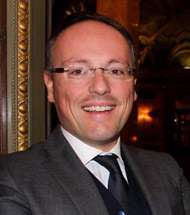Introducing different religions startingin primary school to promote respect for others
Matteo Nacci, professor at the Pontifical Lateran University, gave a presentation at ICS and proposed a model of church-state cooperation within so-called "positive secularism" that helps foment peaceful coexistence among different confessions

FOTO: Cedida
Promoting open policies that encourage knowledge of all religions starting in primary school can generate a breeding ground for reciprocal respect among followers of various belief systems, or so Matteo Nacci argues. Nacci holds a doctorate in Canon Law and Philosophy of Law and is a professor at the Pontifical Lateran University. The expert shared his proposal at the Institute for Culture and Society (ICS), where he gave a seminar within the Religion and Civil Society project.
Professor Nacci proposes a model of cooperation between church and state that "is inserted in a positive consideration of the religious phenomenon and in an effective protection of the right to religious freedom without undermining the non-confessional character of the democratic state."
He contrasts it with the contemporary French model, which he intends to rise above "with the concept of 'positive secularism.'" In this positive context, the non-confessional nature of the state "should not lead to the abolition of symbols in public spaces," which he considers wrong "insofar as human beings as such manifest themselves through symbols."
Professor Nacci adds that, "at the social, anthropological and religious level, it is necessary to listen to the other," which is why he advocates for fostering the participation of religious institutions in public life. He argues for ending the vicious circle in which religions are unknown and feared, which reinforces rejection and makes people not want to get to know them through "dialogue and cooperation."
Practical application of the modelTo make the ideal of “positive secularism” possible, Professor Nacci considers educational and informative initiatives a priority, for example, organizing round tables between politicians and exponents of different religions or setting up institutes and centers that build bridges between communities and states, etc.
He recognizes that mutual understanding is a "very pressing" need in today's world given globalization and increased migration. As he explains, these phenomena have led to far more heterogeneous countries with different beliefs: "This leads to cultural differences, social sensitivity, religious feelings..."
In this sense, "Spain and Italy,” he points out,“are liquid communities— they are no longer made up by a people with unitary thought and many identity groups have emerged." Professor Nacci further notes that Spain and Italy are secular countries, but these liquid communities demand an "ethical, cultural and social" discourse that differentiates religions.
